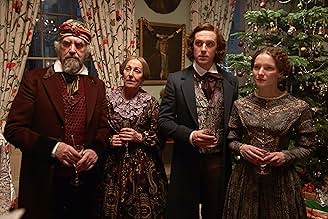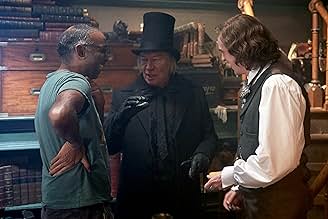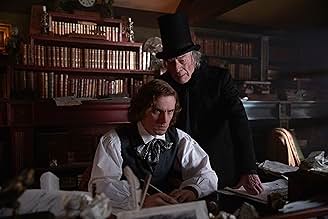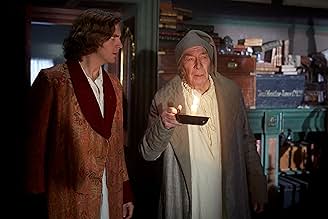VALUTAZIONE IMDb
7,0/10
20.784
LA TUA VALUTAZIONE
Il viaggio che ha portato alla creazione di "Canto di Natale" da parte di Charles Dickens, un racconto senza tempo che dà una nuova definizione del Natale.Il viaggio che ha portato alla creazione di "Canto di Natale" da parte di Charles Dickens, un racconto senza tempo che dà una nuova definizione del Natale.Il viaggio che ha portato alla creazione di "Canto di Natale" da parte di Charles Dickens, un racconto senza tempo che dà una nuova definizione del Natale.
- Regia
- Sceneggiatura
- Star
- Premi
- 2 vittorie e 8 candidature totali
Cosimo Fusco
- Signor Mazzini
- (as Cosimo Massimo Fusco)
Jasper Hughes Cotter
- Walter Dickens
- (as Jasper Hughes-Cotter)
Recensioni in evidenza
After missing this 2017 film, I agreed with my family: Considering the hot summer months and the rising political and social temperatures as well, an early visit to Christmas and the man who helped remind us what the holiday is all about was a pretty good idea (as in, why can't we think like this all year-round?).
"The Man Who Invented Christmas" revolves around Charles Dickens (played by Dan Stevens of "Downton Abbey" fame) and the personal and creative journey he took in writing his beloved novel, "A Christmas Carol."
Dickens, who wrote the book in 1843, intended it to "strike a sledge hammer blow" for the poor, an idea that sprang from a trek to Manchester, where he observed the plight of manufacturing workers, and from what he had seen at the Field Lane Ragged School.
History tells us that his characters leapt to life in his consciousness and that he became so engrossed he "wept and laughed, and wept again," and that he "walked about the black streets of London fifteen or twenty miles a night when all sober folks had gone to bed."
The film is sumptuous, the production values and photography lush and appealing and, when appropriately necessary, cautionary and convincing.
Stevens is excellent as the driven author, moving from warmth to near creative madness without overdoing either, but Christopher Plummer as the imaginary Scrooge he conjures in his mind nearly steals the show, trading barbs and supplying the logic of someone who has forgotten the meaning of love and life.
It's a special fascination to see how artists think and work, borrowing bits and pieces from the people and happenings around them to knit a separate entity that then stands alone by itself.
I didn't find the film preachy or message-driven, though it's impossible in the current climate not to think that some of what's going on here and across Europe may not have seeped into the production. Art usually reflects the fervor of its time.
Still in all, viewers across the political spectrum will find the film more than enjoyable and a welcome reminder that we should _ and can _ celebrate each other all the time, not just in advance of exchanging Christmas presents and knocking back a cold one.
Adding some spice to the film is some clever humor delivered by actors top to bottom who clearly have the training and experience to bring a funny line into the winner's circle.
It's said that "A Christmas Carol" reawakened the spirit of Christmas in both Britain and America.
I think watching this movie does the same thing for viewers too no matter the time of year, and considering what we're experiencing now, that ain't a bad thing.
"The Man Who Invented Christmas" revolves around Charles Dickens (played by Dan Stevens of "Downton Abbey" fame) and the personal and creative journey he took in writing his beloved novel, "A Christmas Carol."
Dickens, who wrote the book in 1843, intended it to "strike a sledge hammer blow" for the poor, an idea that sprang from a trek to Manchester, where he observed the plight of manufacturing workers, and from what he had seen at the Field Lane Ragged School.
History tells us that his characters leapt to life in his consciousness and that he became so engrossed he "wept and laughed, and wept again," and that he "walked about the black streets of London fifteen or twenty miles a night when all sober folks had gone to bed."
The film is sumptuous, the production values and photography lush and appealing and, when appropriately necessary, cautionary and convincing.
Stevens is excellent as the driven author, moving from warmth to near creative madness without overdoing either, but Christopher Plummer as the imaginary Scrooge he conjures in his mind nearly steals the show, trading barbs and supplying the logic of someone who has forgotten the meaning of love and life.
It's a special fascination to see how artists think and work, borrowing bits and pieces from the people and happenings around them to knit a separate entity that then stands alone by itself.
I didn't find the film preachy or message-driven, though it's impossible in the current climate not to think that some of what's going on here and across Europe may not have seeped into the production. Art usually reflects the fervor of its time.
Still in all, viewers across the political spectrum will find the film more than enjoyable and a welcome reminder that we should _ and can _ celebrate each other all the time, not just in advance of exchanging Christmas presents and knocking back a cold one.
Adding some spice to the film is some clever humor delivered by actors top to bottom who clearly have the training and experience to bring a funny line into the winner's circle.
It's said that "A Christmas Carol" reawakened the spirit of Christmas in both Britain and America.
I think watching this movie does the same thing for viewers too no matter the time of year, and considering what we're experiencing now, that ain't a bad thing.
"The Man Who Invented Christmas" is a fictional biographical look at famed English author, Charles Dickens, and the circumstances of his life and time that led to the writing and publication of "A Christmas Carol." The full title by Dickens then was "A Christmas Carol in Prose: Being a Ghost-story of Christmas." Dickens first published it himself in 1843, after a falling out with his regular publishers.
From start to scratch, it took Dickens just six weeks to give the world what would become one of the great classic stories of all time. At least, that's the premise of the film, which itself is based on a 2011 novel of the same title by Les Standiford. The book's subtitle explains a little more, lest there be any confusion regarding the much older Christmas origins of St. Nicholas and of the birth of Jesus. It's about "How Charles Dickens's A Christmas Carol Rescued His Career and Revived Our Holiday Spirits."
According to some reviews, Standiford did considerable research for his book. The background on Dickens's family, his writing to that time, and his precarious financial situation then is likely in public records. Still, much of that part of the story is interesting and probably not that well known by most people, including fans of Dickens books. The very colorful segments of imagination in this movie are another matter. How much of that may have been able to be traced to notes by Dickens himself, or to other sources, is uncertain. But, this serves as a very good technique for the author, and the filmmakers, to get across to a non-writing public how a great story teller may come to the plots and characters of a book he or she will write. After all, who can't remember a time as a child when one's thoughts roamed freely into a world of make-believe?
So, what we would come to call day-dreaming, is a very likely and real way that Dickens, and some other authors like him (surely, the great story-tellers, at least) would have thought up and developed their plots and characters. And, the interplay of the hero's daydreams here, with constant interruptions from family and friends, helps one understand the frustrations and difficulties Dickens had as he hurried to get out a Christmas book in time - something his publishers deemed would not fly. Of course, everyone knows the outcome, but this story is well done, and the film is very good.
The acting is mostly superb throughout "The Man Who Invented Christmas." Dan Stevens gives believable life to the character of Dickens. He even looks very much like Dickens from a portrait of the author around that age - 31. Justin Edwards is very good in the role of Dickens's friend, John Forster. Forster was himself a writer, and it was his 1872-74 biography of Charles Dickens that is the best and most authoritative source on Dickens. Moryfdd Clark plays Dickens's wife Kate, and Jonathan Pryce plays Charles's father, John Dickens. Christopher Plummer plays the character of Scrooge in Dickens's daydreams. That and some other small parts lend some humor to the story.
There are some small deviations in the script from the real background in Dickens's life. For instance, it implies that he didn't like reporting or journalism work and calls it names. In real life, he was a reporter, general writer and editor of newspapers and magazines. One interesting thing to note is that this film was shot entirely in Ireland. The cast is mostly made up of English and Irish actors, with an occasional Italian or French actor here or there. And, while they aren't mentioned in the movie, the three "flops" alluded to, for which Dickens was now in dire straits, would be: "Nicholas Nickleby" of 1838-39, "The Old Curiosity Shop" of 1840, and "Barnaby Rudge" of 1841. Of course, all have been published since then, and none are considered flops.
"A Christmas Carol" must top any serious list of Christmas movies, and there are a number of variations with prominent actors playing the different roles over the ages. This film, about the author and origin of the classic novella, is a very good and most enjoyable story to add to one's Christmas collection. An ideal family situation at yuletide might be to show this film first and then watch the favorite (or two) renditions of "A Christmas Carol" movie.
Of all the many versions of "A Christmas Carol" being made yet well into the 21st century, I don't think any can compare to the best films of the mid-20th century. At the top of my list is the 1951 film that stars Alastair Sim. Close behind that is the 1938 film that stars Reginald Owen and Gene Lockhart. The best TV film made so far, is that of 1984 that stars George C. Scott. And, for those among younger audiences who can't stand black and white films, the 1951 classic with Alastair Sim has a colorized version.
But, whatever version or film of the Dickens classic one watches, it's sure to help take the humbug out of the Christmas season as it did in England on that Christmas of the mid-1800s.
Here are some favorite lines from this film.
Elizabeth Dickens, "No one is useless in this world..." Charles Dickens, "...who lightens the burden of another - I know." Elizabeth, "For all his faults, you won't find a kinder man." Charles, "Hmmm. How long he is growing up to be one."
Mr. John Dickens, "We must not disturb the poet when the divine frenzy is upon him."
Charles Dickens, "Oh, skittle shins to Mrs. Fisk."
Mr. John Dickens, stepping off the train in London, "Ah! Nothing like the air of the metropolis to put color in your cheeks, eh, mother?"
Mr. John Dickens, "Procrastination is the thief of time, eh Charles?"
From start to scratch, it took Dickens just six weeks to give the world what would become one of the great classic stories of all time. At least, that's the premise of the film, which itself is based on a 2011 novel of the same title by Les Standiford. The book's subtitle explains a little more, lest there be any confusion regarding the much older Christmas origins of St. Nicholas and of the birth of Jesus. It's about "How Charles Dickens's A Christmas Carol Rescued His Career and Revived Our Holiday Spirits."
According to some reviews, Standiford did considerable research for his book. The background on Dickens's family, his writing to that time, and his precarious financial situation then is likely in public records. Still, much of that part of the story is interesting and probably not that well known by most people, including fans of Dickens books. The very colorful segments of imagination in this movie are another matter. How much of that may have been able to be traced to notes by Dickens himself, or to other sources, is uncertain. But, this serves as a very good technique for the author, and the filmmakers, to get across to a non-writing public how a great story teller may come to the plots and characters of a book he or she will write. After all, who can't remember a time as a child when one's thoughts roamed freely into a world of make-believe?
So, what we would come to call day-dreaming, is a very likely and real way that Dickens, and some other authors like him (surely, the great story-tellers, at least) would have thought up and developed their plots and characters. And, the interplay of the hero's daydreams here, with constant interruptions from family and friends, helps one understand the frustrations and difficulties Dickens had as he hurried to get out a Christmas book in time - something his publishers deemed would not fly. Of course, everyone knows the outcome, but this story is well done, and the film is very good.
The acting is mostly superb throughout "The Man Who Invented Christmas." Dan Stevens gives believable life to the character of Dickens. He even looks very much like Dickens from a portrait of the author around that age - 31. Justin Edwards is very good in the role of Dickens's friend, John Forster. Forster was himself a writer, and it was his 1872-74 biography of Charles Dickens that is the best and most authoritative source on Dickens. Moryfdd Clark plays Dickens's wife Kate, and Jonathan Pryce plays Charles's father, John Dickens. Christopher Plummer plays the character of Scrooge in Dickens's daydreams. That and some other small parts lend some humor to the story.
There are some small deviations in the script from the real background in Dickens's life. For instance, it implies that he didn't like reporting or journalism work and calls it names. In real life, he was a reporter, general writer and editor of newspapers and magazines. One interesting thing to note is that this film was shot entirely in Ireland. The cast is mostly made up of English and Irish actors, with an occasional Italian or French actor here or there. And, while they aren't mentioned in the movie, the three "flops" alluded to, for which Dickens was now in dire straits, would be: "Nicholas Nickleby" of 1838-39, "The Old Curiosity Shop" of 1840, and "Barnaby Rudge" of 1841. Of course, all have been published since then, and none are considered flops.
"A Christmas Carol" must top any serious list of Christmas movies, and there are a number of variations with prominent actors playing the different roles over the ages. This film, about the author and origin of the classic novella, is a very good and most enjoyable story to add to one's Christmas collection. An ideal family situation at yuletide might be to show this film first and then watch the favorite (or two) renditions of "A Christmas Carol" movie.
Of all the many versions of "A Christmas Carol" being made yet well into the 21st century, I don't think any can compare to the best films of the mid-20th century. At the top of my list is the 1951 film that stars Alastair Sim. Close behind that is the 1938 film that stars Reginald Owen and Gene Lockhart. The best TV film made so far, is that of 1984 that stars George C. Scott. And, for those among younger audiences who can't stand black and white films, the 1951 classic with Alastair Sim has a colorized version.
But, whatever version or film of the Dickens classic one watches, it's sure to help take the humbug out of the Christmas season as it did in England on that Christmas of the mid-1800s.
Here are some favorite lines from this film.
Elizabeth Dickens, "No one is useless in this world..." Charles Dickens, "...who lightens the burden of another - I know." Elizabeth, "For all his faults, you won't find a kinder man." Charles, "Hmmm. How long he is growing up to be one."
Mr. John Dickens, "We must not disturb the poet when the divine frenzy is upon him."
Charles Dickens, "Oh, skittle shins to Mrs. Fisk."
Mr. John Dickens, stepping off the train in London, "Ah! Nothing like the air of the metropolis to put color in your cheeks, eh, mother?"
Mr. John Dickens, "Procrastination is the thief of time, eh Charles?"
It actually took me a while to put this movie into a box. Is it a biography about Charles Dickens, or another version of the classic story being told? It's both.
It's actually like you watch a theater play that includes special effects you all have to imagine yourself during a play. You can clearly see the theatrical approach that the director wanted to take here. Christopher Plummer is an excellent Scrooge, the perfect fit! Even though this film throws in a good bit of comedy into the pot, it doesn't harm the story at all. If anything, it brings a little bit of freshness to the old classic of "A Christmas Carol".
I wouldn't describe it as a Christmas movie, or something that the whole family can enjoy for Christmas, but it certainly is a (long needed) new and modern approach to this story and that is still fascinating me, that this story indeed, never gets old.
It's actually like you watch a theater play that includes special effects you all have to imagine yourself during a play. You can clearly see the theatrical approach that the director wanted to take here. Christopher Plummer is an excellent Scrooge, the perfect fit! Even though this film throws in a good bit of comedy into the pot, it doesn't harm the story at all. If anything, it brings a little bit of freshness to the old classic of "A Christmas Carol".
I wouldn't describe it as a Christmas movie, or something that the whole family can enjoy for Christmas, but it certainly is a (long needed) new and modern approach to this story and that is still fascinating me, that this story indeed, never gets old.
I was all set to dislike this. The title is so pompous that it's bound to fail. The thing is that there is enough factual biographical material to float the boat. Most of the major events did take place. What makes this work is the incorporation of characters from "A Christmas Carol" who play a role in his creative process. Christoper Plummer is excellent as the incarnation of Ebenezer Scrooge. Obviously, these are in the mind of the great writer and portrayed in a corporeal form in the movie. We see Dickens as a flawed man who overspends and over reacts. It is a fun film to look at as eighteenth century England is front and center. It was also neat to see some interesting angles relating to the book.
For me this is how you do a good biopic. Stay faithful to what happened but at the same time be creative with the way you tell the story. This is a mix of fairy tale and history, which is the exact formula needed to tell the story of the creation of A Christmas Carroll. The book is such an iconic piece of literature that helped reshape the way people in England saw Christmas, and the movie shows very well how that happened. The cast is good, headlined by the excellent Christopher Plummer playing a wonderful Scrooge. Good period recreation and well directed, this movie has little faults. For it to be a crowd-pleaser while also historically accurate is not an easy task and if I can find any flaw is that it plays a little too safe. Nevertheless, well done.
Lo sapevi?
- QuizCharles Dickens' family did, indeed, keep a pet raven, which died unexpectedly while the family was away. Dickens told this story to another author - Edgar Allan Poe - who was then inspired to write a poem about a raven.
- BlooperDespite their portrayal, Dickens and Thackeray were on very friendly terms in 1843. Their feud only started towards the end of the 1850s when Dickens became jealous of Thackeray being compared to him. Thackeray responded by publicly criticizing Dickens' decision to abandon his wife. In addition, Thackeray boasts about the money his latest book has earned. In reality, Thackeray was a struggling hack writer in 1843. He didn't achieve a major success until the publication of Vanity Fair in 1847. Dickens and Thackeray were reconciled shortly before the latter's death in 1863.
- Citazioni
Charles Dickens: No one is useless in this world who lightens the burden of another.
- ConnessioniFeatured in Box Office: Episodio datato 30 novembre 2017 (2017)
- Colonne sonoreYankee Doodle Dandy
Performed by The Band of the Royal British Legion
I più visti
Accedi per valutare e creare un elenco di titoli salvati per ottenere consigli personalizzati
- How long is The Man Who Invented Christmas?Powered by Alexa
Dettagli
- Data di uscita
- Paesi di origine
- Siti ufficiali
- Lingue
- Celebre anche come
- El hombre que inventó la Navidad
- Luoghi delle riprese
- Aziende produttrici
- Vedi altri crediti dell’azienda su IMDbPro
Botteghino
- Lordo Stati Uniti e Canada
- 5.676.486 USD
- Fine settimana di apertura Stati Uniti e Canada
- 1.357.129 USD
- 26 nov 2017
- Lordo in tutto il mondo
- 8.127.070 USD
- Tempo di esecuzione1 ora 44 minuti
- Colore
- Proporzioni
- 2.35 : 1
Contribuisci a questa pagina
Suggerisci una modifica o aggiungi i contenuti mancanti




































